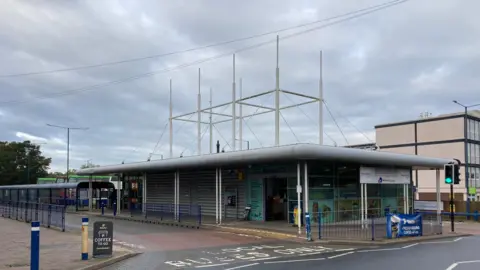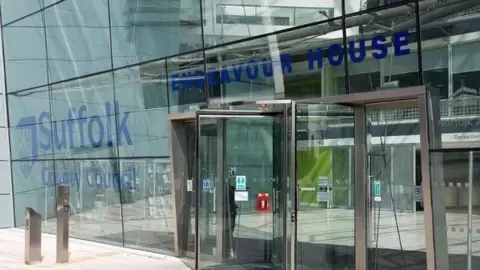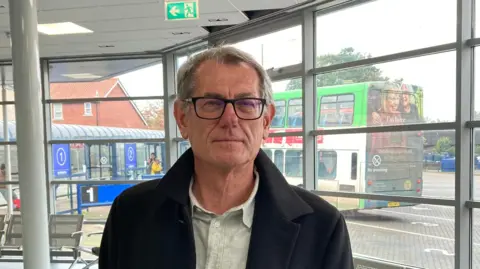Bus station is dubbed an 'embarrassing welcome'
 Luke Deal/BBC
Luke Deal/BBCA bus station has been dubbed an "embarrassing welcome" to a town by the owner of a bus company.
West Suffolk Council's scrutiny committee will look at the cutting of rural bus services in a meeting in Stanton from 17:00 GMT.
However, the meeting's documents show a statement from David Munson, the owner of Mulleys buses, who believes Bury St Edmunds' bus infrastructure needs improvement and more investment.
The council previously inherited the bus station and Cliff Waterman, its Labour leader, said the concerns had been noted ahead of the meeting.
Mr Munson stated he believed "very little" had been done in the borough to help bus providers.
"Unlike Ipswich, Bury St Edmunds has no bus lanes, no priority areas, dirty unkept bus shelters, a bus station with no staff or information desk and a filthy row of bus shelters," he said in his statement.
"The whole bus station is an embarrassing welcome to Bury St Edmunds."
 Brian Farmer/BBC
Brian Farmer/BBCHe argued the council could find funding to improve infrastructure by, for example, increasing the price of tickets at The Apex venue.
A spokesperson for the council, in response, said "millions of pounds" had been invested in the local economy with measures such as the acquisition of property in Anglia Lane in Bury St Edmunds.
A statement from Suffolk County Council similarly noted that removal of staff from the bus station "had a detrimental impact on anti-social behaviour on site".
It added that this had led to many passengers "switching at other stops nearby when possible".
It added that the station was "some distance from the main town centre" - which could not be accessed by buses.
"As such, the best way to guarantee that a journey can be made by those with physical impairments is through the Connecting Communities services," it added.
 Luke Deal/BBC
Luke Deal/BBCMr Waterman said the council had "no statutory duty" to provide buses or their infrastructure due to not being a highway or transport authority, but had historically "provided discretionary facilities in some local communities to support bus travel".
He explained that the council's predecessor, St Edmundsbury Borough Council, voluntarily invested in a new bus station in Bury St Edmunds during bus deregulation and when the old one was not replaced.
"Deregulation meant bus operators no longer had to provide facilities like this for their customers," he said.
"Since then the West Suffolk Council took the station on and, despite receiving no funding for it, has invested in it.
"This is a small station and like many of its kind across the country, is unmanned."
In response to the statements in the report, Mr Waterman said the council was "keen to have urgent talks" with partners on how running costs could be shared in the future.
However, he raised the point that the concerns did not "suggest that the condition of bus station is the underlying reason for the reduction in rural bus services".
Follow Suffolk news on BBC Sounds, Facebook, Instagram and X.
